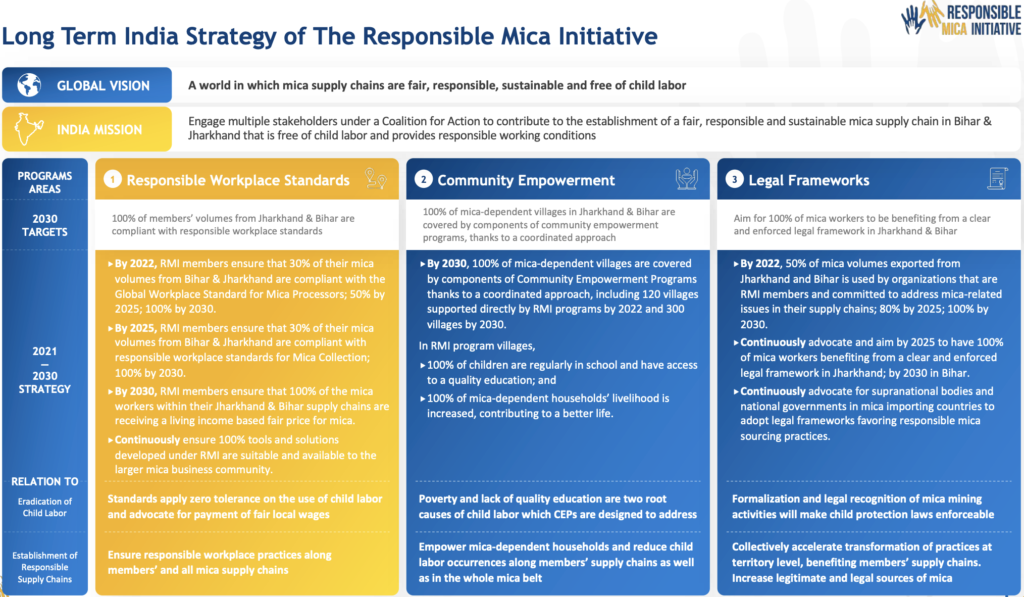RMI members are convinced that to achieve their goals, they have to address all the underlying factors that contribute to poor working conditions and the use of child labor. They believe that these factors also need to be addressed at the same time. Only a holistic and simultaneous approach can lead to long-lasting and sustainable change. Success would not be achievable if only selected factors were eliminated or if all factors were addressed but only sequentially.
Mica Supply Chain Mapping and Workplace Standards for Mica Collection and Processing – RMI members must map the source of mica in their products to exporters, processors and mines in India. Each member’s supply chain participant must then adopt workplace environment, health, safety and fair labor practices that include a prohibition on the use of child labor.
Community Empowerment in Villages that Provide the Mica Workforce – Villages that provide the workforce for mica mines and processors are empowered to access improved educational resources for children, better health care, alternative means of livelihood to reduce economic dependency on mica, and government social programs.
Legal Frameworks for the Mica Sector – RMI encourages the creation of laws and regulations and related enforcement mechanisms that will govern all aspects of the mica industry and establish a responsible and sustainable mica supply chain.
To effectively implement its three program pillars the Responsible Mica Initiative works with multiple stakeholders from a variety of disciplines and organizations who bring their expertise and commitment to address the mica challenge.
Members are drawn from diverse industries in the mica supply chain both around the world and in India. Membership also includes civil society and non-government organizations (CSOs and NGOs) devoted to promoting and protecting the rights of children alongside industry associations that represent sectors using mica.
The mica challenge requires a global approach but local execution. RMI relies extensively on a variety of local program partners in India who provide technical expertise and first-hand knowledge of the region and human rights issues and have the trust of community members. RMI partners with leading Indian civil society or non-governmental organizations (CSOs or NGOs) to develop and implement its Supply Chain Mapping and Workplace Standards and Community Empowerment programs. These organizations combine forces and create efficiencies by collaborating and operating within consortiums, each of which is managed by a lead program partner.
Our partners, in turn, mobilize community leaders in the villages and government officials in the region to ensure that RMI programs are feasible and are designed to achieve desired goals. Local support and endorsement also accelerate the adoption of RMI programs in additional villages. RMI also engages with global inter-governmental organizations such as the ILO and OECD as well as participates in industry forums to raise awareness, align approaches and communicate progress on program implementation.
Partnerships have also been established with mica industry leaders in Bihar and Jharkhand who lend their industry knowledge and provide practical guidance on workplace practices and legal requirements that will foster a responsible and sustainable sector.
